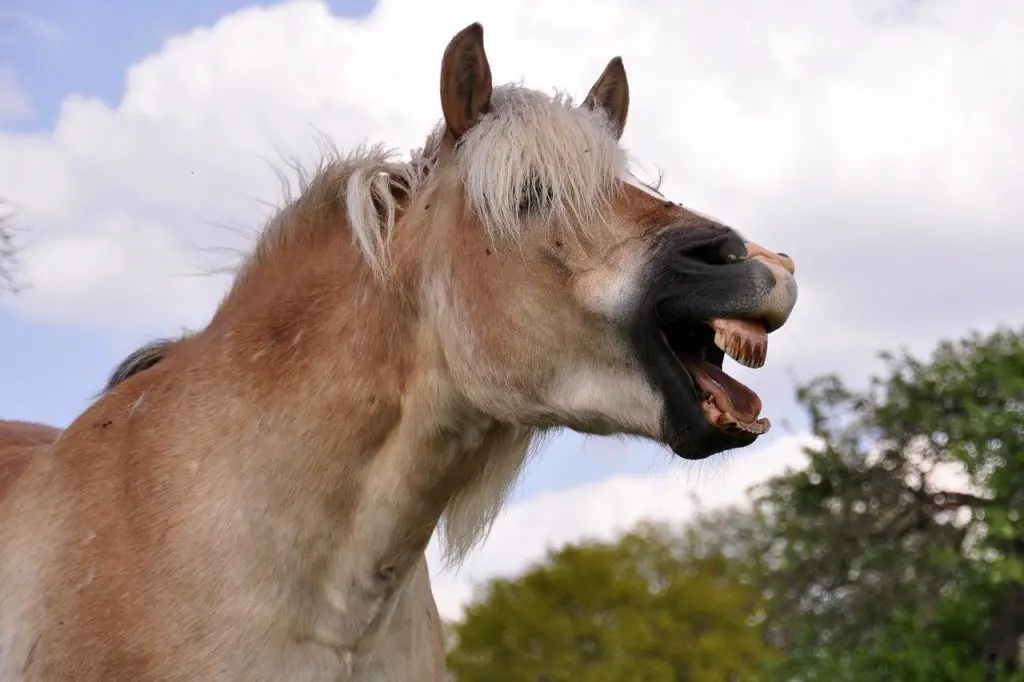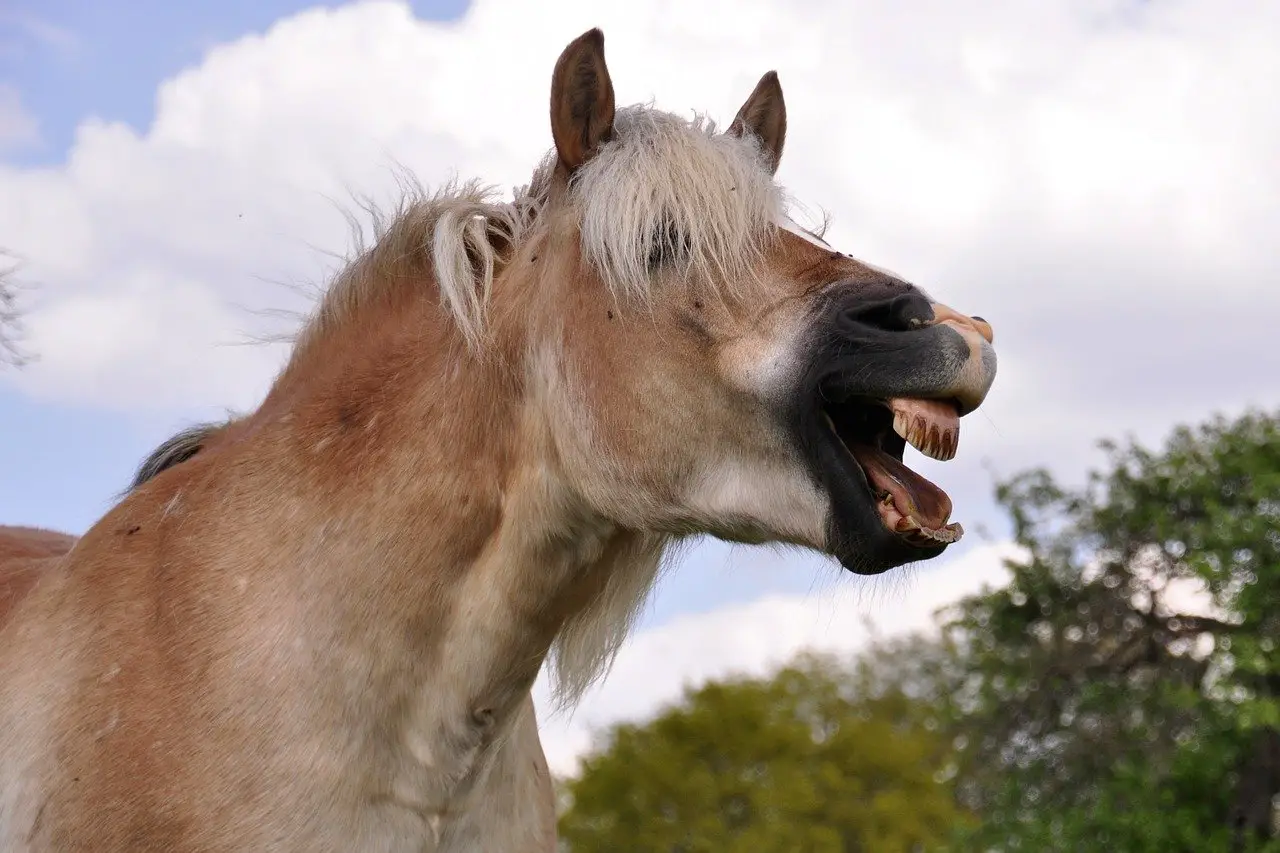Last Updated on February 22, 2022 by Allison Price
While I was feeding our horses recently, I remembered that horses don’t have the ability to vomit. But I didn’t understand why. So I did some research and found out why horses don’t vomit.
Horses don’t have to vomit due to a strong lower-esophageal Sphincter. This acts as a one way valve and prevents food from rising. The strength of the valve means that food and water can pass through the sphincter into the stomach. However, the contents cannot travel backwards.
Horse owners are often unaware that horses don’t vomit. There are many things you can learn about horses’ digestive system and how they prevent them from vomit.
Why can’t a horse vomit?
Horses can’t vomit because of their lower esophageal strength. This is the most common reason. Horses, humans, and other animals all have a lower-esophageal (LES).
Horses’ lower esophageal is vital to their digestive system. It attaches to the stomach at an angle and the muscle surrounding it gives food its final push into the horse’s stomach.
Humans have the same sphincter muscles that help food get to their stomachs and close them. The sphincter is a pressure valve that works in one direction.
The valve allows food to travel through it and into the stomach just as it does for horses. What makes us unique is that when pressure builds up in our stomach, the LES is forced to open and our stomach contents are allowed to return into our esophagus. We vomit.
Horses’ LES remains closed even when pressure is applied, so it is a one-way valve. The material cannot flow back into or out of the horse’s mouth through their lower esophageal.

It is almost impossible to open the stomach with internal pressure once the muscular sphincter has shut. If you see a horse vomiting, it’s likely that it is in serious distress and has burst its stomach or esophagus.
Other factors, in addition to the strength of your sphincter help keep the valve shut. It is located at an angle so that it closes when gas is distended.
We all know that our stomach muscles contract when we vomit. This is not the case for horses. Their abdominal muscles are located within the horse’s rib cage making it difficult for them to assist in the vomiting process.
Horses are believed to have no vomiting reflex. However, we know that horses can’t vomit because their stomach contents aren’t allowed to return into the esophagus by the lower esophageal Sphincter.
Does vomiting serve a purpose?
Even though vomiting can be quite unpleasant, it serves a purpose. For many animals and humans, vomiting serves a protective function. It removes food intolerances such as poisons and bacteria from the stomach.
To identify infected and spoiled food, animals use their senses of smell and taste. They are not always able to distinguish between healthy and unhealthy food. Vomiting is an effective defense mechanism that removes infected material from the body.
As protective systems, nausea and vomiting cannot afford to make errors and must therefore have a low threshold of activation. (Click the link to learn more about vomiting.
Animals don’t necessarily vomit to defend themselves. Animals can ingest food from their stomachs to chew it, or swallow large amounts of food and vomit it later to feed their children.
Horses can survive without having to throw up for a few reasons. They are picky eaters and won’t ingest poisons. They graze and eat small amounts of food at a time. Their tiny stomachs also process food quickly.
Horses survived by being unable to vomit.
Evolution has allowed horses to survive thousands of years as prey animals. Horses have evolved to protect themselves from extreme weather and they can communicate warning signs through herds.
Evolution played a part in horses’ inability to vomit. Horses’ survival depends on their ability to dodge predators through their speed and quickness.
Horses run and their stomachs press against their stomachs, creating pressure in the organ. Horses would vomit every time that they ran if their sphincter valve was pressured. The predator would then catch his prey.
It is evident that horses needed to be able to escape predators and keep their food down in order to survive. Horses can develop severe digestive problems if they don’t urinate.
Overeating
One of my grandchildren was watching me as I fed our horses. He filled up a bucket full of sweet feed. The horse was eating at a rapid pace.
Horses who eat too much grain may experience serious problems in their intestinal health. This could lead to diarrhea, colic and abdominal pain. Laminitis can also occur in horses, but it usually doesn’t show symptoms until several days later.
The problem was not caused by enough grain. Horses and horses can have serious health issues if the feed door is left open for too long.
However, in the past I have owned horses with colic. Because they can vomit and release pressure from their stomachs, this condition is not common in horses.
You can help your horse if he is colicky by keeping him on his feet. You should also contact your veterinarian immediately.
Horse care professionals should be notified if horses are given too much high-starch grains. It is important to address these issues quickly in order to reduce or prevent the severity of the damage.
Colic can be caused by many things. Some are unrelated to horses’ inability to throw up. However, others are.
What happens to a horse if it throws up?
Horses that throw up are in serious condition and may die. To get help, you should immediately contact your vet. Horses that vomit are usually caused by an organ burst in their digestive system.
Most likely is a ruptured stomach due to extreme pressure. Horses’ lower esophageal valve can withstand a lot of pressure.
Pressure builds up in the stomach. It must go somewhere. Or it can explode and cause the animal to escape. It may seem like vomit is escaping but it’s actually a more serious episode.



